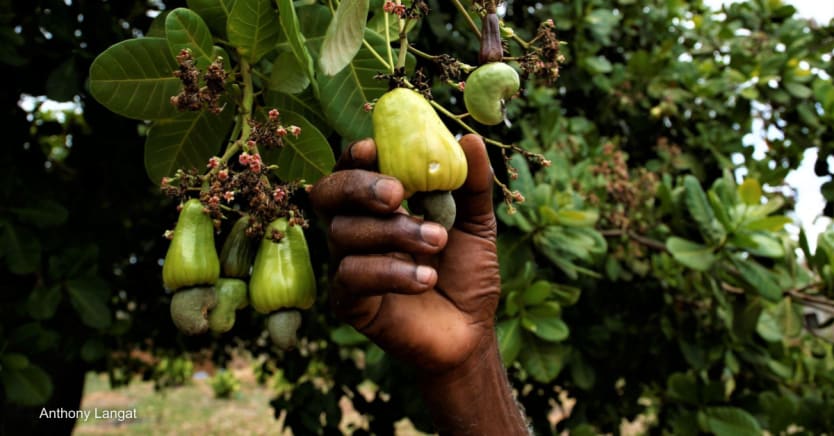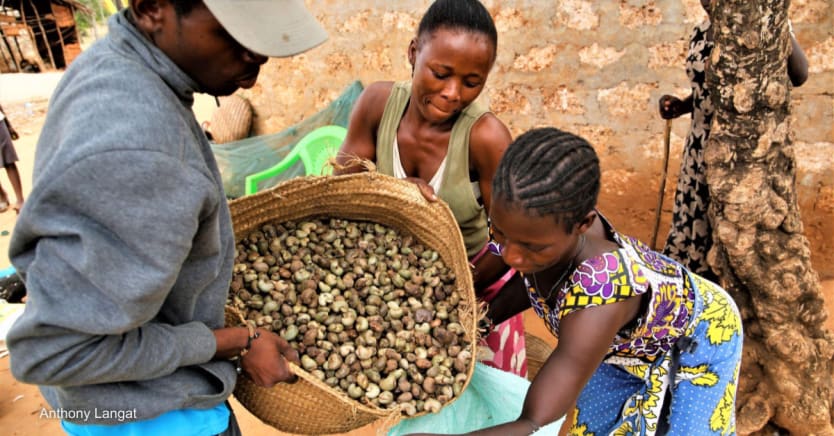
It is late morning in Kagagacha village in Kenya’s Kilifi county, and Ishmael Bulushi goes about checking his small harvest of cashew nuts drying out on his compound. The dark gray nuts are laid out on a rusty iron sheet on the ground next to his house, which overlooks his three-acre (12,140 square meters) farm that stretches down to a small stream.
Get the inside track on how agriculture, nutrition, sustainability, and more are intersecting to remake the global food system in this weekly newsletter.
Bulushi has planted mango trees, palm trees, as well as cashews, and sells the produce to pay his children’s fees and feed his family. He also grows maize and vegetables. He has 60 palm trees and 52 cashew trees, but he relies on the palm trees for most of his income.
His neighbors, Jane Erica and her husband also own three acres of land in the same village and have 28 cashew trees. They have lived in their present home for three years, and cashews have not been their best crop — until now.
Over 1,500 farmers in Matsangoni, the area where Erica and Bulushi live, are part of a project that seeks to improve the production of cashew nuts, which has been neglected for years. Following improved yields after its pilot project, Empowering Farmers Foundation — an NGO that focuses on improving the well-being of smallholder farmers — is betting on improved agronomic practices, farmer groups, and market access to get the cashew subsector off the ground for farmers in Kenya’s coastal region.
Cashew production was vibrant in Kenya during the 1960s and ’70s. But the decline and subsequent collapse of the Kenya Cashewnut Factory — due to government corruption — paralyzed the sector. It went from commanding 5.9% of world production in 1969 with an annual production of 24,000 metric tons (24 million kilograms) to just 12,667 metric tons in 2020.
Village startups battling the fraudulent seed market in Kenya
In a bid to improve access to high-quality agricultural inputs, trusted village startups in Kenya have started to supply smallholder farmers with quality seeds and fertilizers.
In its 2020 report, the Nut and Oil Crops Directorate stated that the cashew industry “faces a bleak future as a result of uncertainties stemming from poor quality and dwindling volumes.” But Mathew Mwamuye, EFF’s coordinator in the Matsangoni area, said their project sought to show farmers that cashew farming can still generate an income for them.
“We [are] going to give farmers hopes through managing pests and diseases and also ensuring that they get better prices for the produce,” he said.
According to the Kenya Agriculture and Livestock Research Organization, powdery mildew disease is the most serious biological constraint in cashew nut farming. It is a fungal disease that attacks young panicles and flowers, consequently affecting the apple and the nut, causing up to 70% to 100% of crop loss.
EFF started with a survey in May to establish the number of cashew trees in Matsangoni, and they found there were a total of 52,000 cashew trees owned by 1,569 farmers.
Kamini Menon, EFF’s country representative said that the organization brought in cashew experts from Tanzania to help with training the operators and other officials who would work on the cashew improvement program. They trained people who would spray the cashews with pesticides to control mealybugs and fight diseases, and hired and deployed 12 pump operators and 12 assistants to farms across the 93.20 square kilometer Matsangoni area. Between August and November, they sprayed each of the 52,000 trees three to five times.
“We had to spray [several times] because you find that with the cashew tree, some branches will have flowers and others won't, and others have young leaves so they do not produce at the same time,” said Stephen Konde, a farmer and operator of the spraying machines.
This was a first for farmers in Matsangoni as they had never sprayed their cashew crops, and had not received any assistance from agricultural extension officers on how to care for the trees and protect them from pests and diseases.
“Pests and diseases disappeared not only on the cashew trees but also on my mangoes, which I have planted side by side,” Bulushi said.
A 2009 survey found that 20% of cashew trees in Kenya are no longer productive. According to Menon, the project hopes to increase productive cashew trees in the region.
“We have developed a Phase 1 project plan [2022-26] that aims to reach about 200,000 smallholder farmers in six coastal counties and achieve 8 million productive cashew trees producing 140,000 MT of raw cashew nuts,” Menon said.
As soon as the cashew apples were bigger and yellowing, Bulushi and Erica were assured of a big harvest.
“I have a tree that didn’t produce any cashew nuts for the past two years but today, I have been collecting at least three kilos [6.6 lbs.] from it every day for the past three days,” Erica said.
Apart from the lack of expertise in cashew, poor pricing also discouraged farmers from investing in pesticides and fungicides for their cashew trees as they would not recoup their costs.
“Cashew nut collection on the farm had been reduced into a children’s affair with many farmers not bothering to give it any importance,” Mwamuye said. “When trees couldn’t produce any cashew, some farmers resorted to selling the cashew trees as firewood.”

Dzidza Mwabule, another cashew farmer, now works as one of the EFF agents who buys and sells the raw cashew to ETG, a company that EFF linked farmers to and buys the nuts at a higher price. Mwabule buys the cashews from farmers for 50 shillings per kilogram — $0.44 — and sells to ETG at 55 shillings per kilogram. This price is up from last year's price of 35 shillings per kilogram.
With the curbing of pests and diseases along with increasing yields, EFF now hopes to ensure that farmers join farmers groups through which they can aggregate their produce and gain better bargaining power following the organization’s exit.
“We haven’t gotten into farmer groups yet, but we will sit down and plan on how we are going to operate going forward. For now, we take whatever we have collected to aggregation centers and in some cases, agents come collecting from farmers' homes,” said Wilmont Gogo, a farmer in Matsangoni.
Update, Jan. 11, 2022: This article has been updated to clarify that Kamini Menon, is the Empowering Farmers Foundation country representative in Kenya.

Search for articles
Most Read
- 1
- 2
- 3
- 4
- 5


